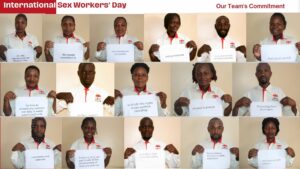Happy International Sex Workers’ Day
Call For a Data Clerk
April 9, 2022
CALL FOR APPLICATIONS – FINANCE OFFICER, KAMPALA REGION
July 22, 2022On this international Sex Workers’ Day;
We remain committed to, maintaining our resistance, and persistence in pursuance of a non-discriminative, and equal world!
Its time to proactively connect our dots in every actor’s action to, protect, respect and fulfil the rights of sex workers including: access to justice, Protecting them from harm, exploitation and coercion. Ensuring they can participate in the development of laws and policies that affect their lives and safety and guaranteeing access to health, education and employment options.
We call for:
1. Call for conclusive investigation into complaints of violence against sex workers with all the fairness and rigor that those complains deserve. Document cases and trends of sex worker rights violations and refrain from using the law to violate rights of sex workers.
2. Invest in development and standardization programs for sex workers which integrate literacy, human rights and digital skills in sex workers service delivery.
3. Investigate and document discriminations and systemic exclusion premised on sex work status and other violations against sex workers.
4. Repealing of these punitive laws (136, 137, 138 and 168 of the Penal code; Section 6 of the Psychotic Drugs and Psychotropic Substances Control Act 2016; and Sections 12, 41, and 43 of the HIV and AIDS Prevention and Control Act 2014
5. Developing a responsive and intersectional comprehensive integrated tracker with all the Universal Health care indicators for Sex workers including for FSWs with intersecting vulnerabilities, and as well as developing guidelines and Standard Operating Procedures to guide efficient delivery of integrated responsive services for children of FSWs and AGYW surviving in sex work settings.
6. Ministry of Health , Ministry of Gender Labor and Social Development, Civil Society Organizations and Implementing Partners invest in establishment, strengthening and scale up of innovative community health, SRHR safe spaces, human rights promotion and social protection systems for sex workers such as the Girls Action Clubs for Adolescent Girls and Young Women, Drop- in Centres (DiCs), Community Health Livelihoods Enhancement groups (CHLEGs) development accelerators, GBV response teams, Community mental health, and trauma informed care systems.

